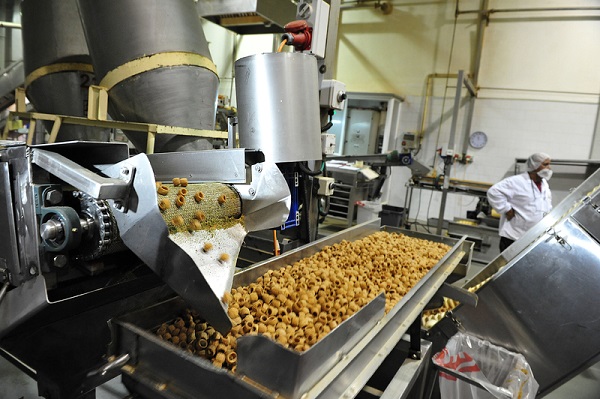Fuchs Petrolub said yesterday it acquired Chevrons worldwide white oils and food machinery lubricants business, which will be integrated into Fuchs Lubricants Co. (USA). The price was not disclosed.
This includes the brands and formulations for our white oils and food-grade product lines, Chevron spokeswoman Quyen Teng told Lube Report. There are no physical assets or personnel involved in the deal.

Photo: Rafael Ben-ari / Dreamstime
Fuchs Petrolub acquired Chevrons white oils and food machinery specialty lubricants business. Food-grade lubes are used in food processing machines such as the one seen here.
A Fuchs spokesperson said the acquisition includes the customer bases for both categories of products. Fuchs has purchased the Superla brand from Chevron, which is specific to the white oils business, the German independent lubricant suppliers spokesperson told Lube Report. The food machinery lubricants business will be integrated under Fuchs existing Cassida brand.
The food industry uses white oils as release agents and to formulate food-grade lubes.
Consultant Geeta S. Agashe, President of Geeta Agashe & Associates LLC, explained that, global mega oil majors are slowly moving away from many of the specialty, niche industrial lubricant segments that require significant customization, increasing SKUs, and that involve providing significant support when volumes purchased per customer are not as high as, say, for hydraulic fluids.
For example, apart from BP Castrol, none of the mega majors are big in the metalworking fluids segment. Fuchs also has an increasing market share in the metalworking fluids business. Similarly within the process oils segment, we do not see active participation from the mega majors, Agashe told Lube Report. The white oils and food machinery lubricants business is also trending that way. However, Fuchs is growing its footprint in this segment as well via acquisitions as well as by pursuing organic growth strategies. They acquired Shells food machinery lubes business in 2010.
In 2014 Fuchs also acquired South Africa-based Lubrasa, which produces and sells food-grade lubes. Mobil, Total, and Lubriplate are the other big players active in the food-grade lubes segment, she noted. Agashe estimated the U.S market for food and beverage machinery lubricants at around 30 million gallons in 2015.
Oils and greases used in food and beverage processing and packaging accounts for an estimated 2 percent to 3 percent of global lubricants demand – perhaps 750,000 to 1.1 million metric tons a year last year, according to LubesnGreases sources.
Parsippany, N.J.-based consultancy Kline & Co. estimated the global white oils market at about 1.5 million tons in 2014, Milind Phadke, a director in the consultancys Energy Practice, told the ICIS Base Oils & Lubricants Conference in London in February 2015. Kline projected moderate growth to 1.6 million tons by 2023. The polystyrene market will decline due to substitution by other polymers and processing improvements, while competition from other materials like waxes will hold down growth. Other segments – such as health and beauty, hot melt adhesive, pharmaceuticals and food – will provide moderate growth, Kline projected.
George Morvey, industry manager for Klines Energy Practice, said the acquisition was classic Fuchs – growth through acquisition. No one should be surprised because they are very public about their intentions. Every acquisition they make makes sense and either fills a gap or strengthens an existing segment or product category.
Morvey noted that the white oils and food-grade lubricants business is important regardless of whether its in a developed or developing country market. Volumetrically its small in comparison to passenger car motor oil, but highly profitable, he told Lube Report. Its a challenging segment to serve for the major oil companies as [it involves] custom formulations, a high level of R&D and technical sales and service support is required by end users, business is skewed more to drum and pail than bulk deliveries, [there is] higher penetration of specialty/synthetics, OEM approvals are required and it has a different competitor base than PCMO, for example.
Fuchs Lubricant Co. CEO Steve Puffpaff said in a news release that the acquisition and new marketer partnerships will significantly improve the scale for support for food-grade lubricant customers.
We believe this change will benefit our customers and marketers as Fuchs is a leader in these specialty segments and can meet their needs with an expanded food machinery product line, Brian Stripling, general manager for brand, technology and original equipment manufacturer, Chevron Products Co., a division of Chevron U.S.A. Inc. Chevron values our customer relationships, and we are committed to a smooth and seamless transition to Fuchs.